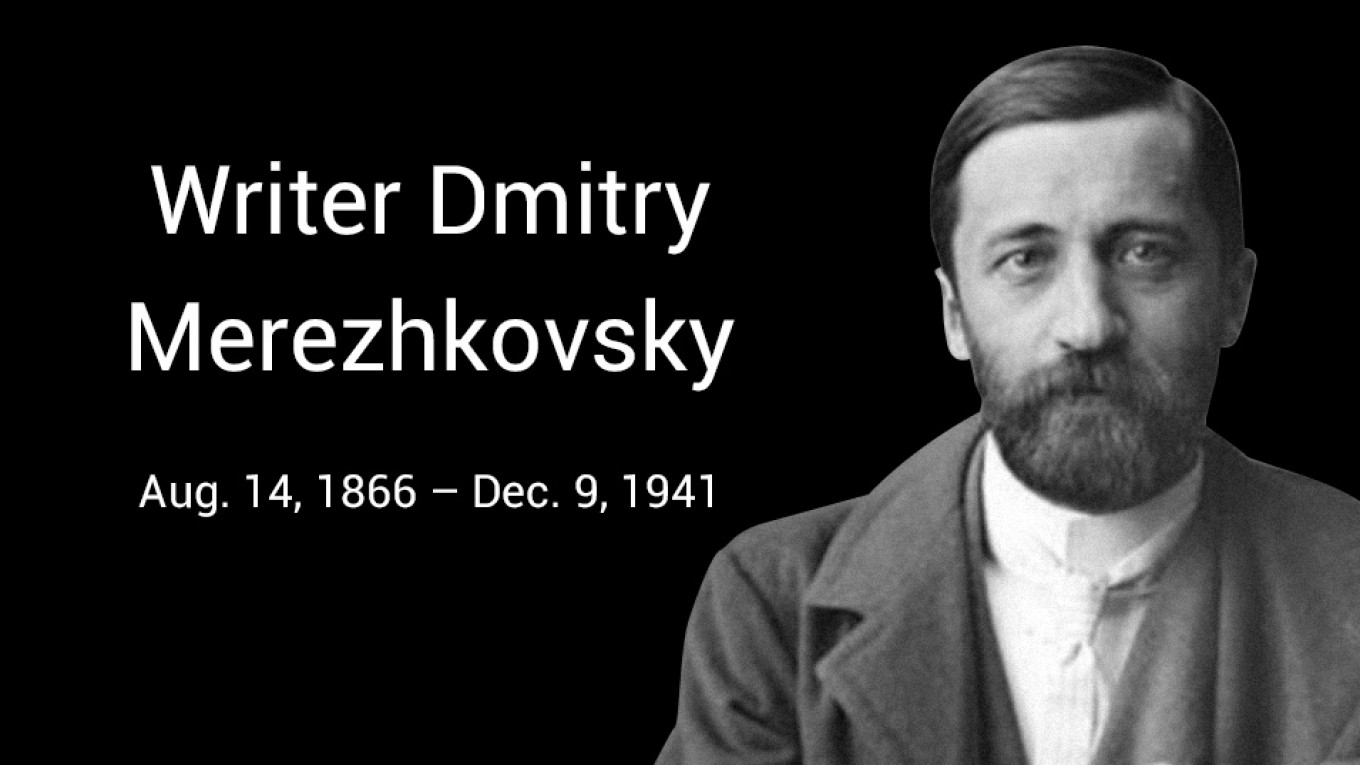Dmitry Merezhkovsky was born in St. Petersburg in 1866 in a family of a government official. In his teen years, and with his mother’s support, he was already writing poetry and contemplating the religious questions that would come to occupy him throughout his life. From 1884 to 1889, he studied philology and history at the University of St. Petersburg.
Merezhkovsky’s first volume of poetry came out in 1888, and his mystical poem “Vera” would become a harbinger of Russian Symbolism. Through writing for leading journals, he met writers who would become the leaders of the Symbolist movement. His second volume of poetry “Symbols: Poems and Songs” came out in 1892. His 1893 essay “On the Causes of the Decline and the New Trends in Contemporary Russian Literature” established both the philosophical foundations and the name of a literary movement.
In 1889, Merezhkovsky married the poet Zinaida Gippius. Together they formulated the idea of a third testament of the Bible, which would bring liberation to humanity. Based on their ideas, the couple established a series of Religious-Philosophical Meetings and the New Path magazine. They supplanted the doctrine of the Russian Orthodox Church with services in their own home, which were deemed blasphemous.
Merezhkovsky’s religious and historical views and opposition to the monarchy and traditional church made him a fierce supporter of revolution. For him, revolution was a crucial step in the liberation of humanity and fulfilment of the third testament, but social revolution could only come after spiritual revolution. He went on to write pro-revolutionary verse and a trilogy of anti-monarchy plays titled “Kingdom of the Beast.” Although Merezhkovsky supported the Russian revolution of 1917, he viewed communist rule as catastrophic for Russia.
In 1919, the couple fled Russia for Minsk, then went on to Vilnius and finally France, where Merezhkovsky would live for the rest of his life. During his exile, he worked for Russian émigré literary journals and became a prominent critic of the Soviet Union. In Paris, Merezhkovsky founded the Religious Union, which held lectures and published articles critical of the Bolsheviks. With fellow Russian writer Ivan Bunin, he successfully lobbied French politicians to financially support Russian immigrants, particularly Russian writers. In 1927, Merezhkovsky and Gippius founded the Green Lamp group and the the New Ship magazine, which became an intellectual hub for Russian émigrés. His antagonism toward communism in Russia led him to support Benito Mussolini, who sponsored his book on Dante and whom Merezhkovsky tried to convince to start a war against Russia. Merezhkovsky’s attitude to the Nazi regime was mixed; he criticized the regime's atrocities but supported the invasion of the Soviet Union.
In parallel with his political activism, Merezhkovsky had a prolific literary career spanning a diverse array of genres: poetry, novels, plays, literary criticism, philosophical essays, and translations. His “Christ and Antichrist” trilogy of novels (1895-1905) revamped the historical novel in Russia. His literary criticism includes biographical works on Russian writers such as Pushkin, Dostoevsky, and Goncharov, which were compiled into “The Eternal Companions.” His Russian translations of ancient Greek plays became highly regarded after his death. Although Merezhkovsky was nominated for the Nobel prize in literature nine times, his works were not published again in Russia until the late 1980s.
In 1941, Merezhkovsky died of a brain hemorrhage with a pen in his hand. He is buried at the Sainte-Genevieve-des-Bois Cemetery.
A Message from The Moscow Times:
Dear readers,
We are facing unprecedented challenges. Russia's Prosecutor General's Office has designated The Moscow Times as an "undesirable" organization, criminalizing our work and putting our staff at risk of prosecution. This follows our earlier unjust labeling as a "foreign agent."
These actions are direct attempts to silence independent journalism in Russia. The authorities claim our work "discredits the decisions of the Russian leadership." We see things differently: we strive to provide accurate, unbiased reporting on Russia.
We, the journalists of The Moscow Times, refuse to be silenced. But to continue our work, we need your help.
Your support, no matter how small, makes a world of difference. If you can, please support us monthly starting from just $2. It's quick to set up, and every contribution makes a significant impact.
By supporting The Moscow Times, you're defending open, independent journalism in the face of repression. Thank you for standing with us.
Remind me later.






